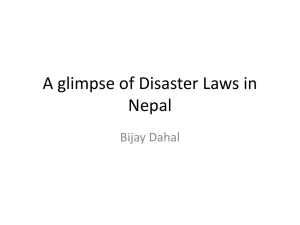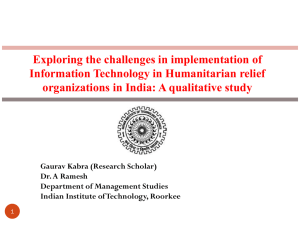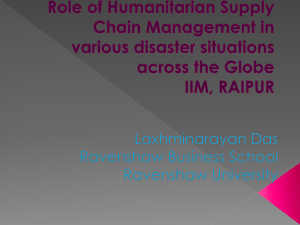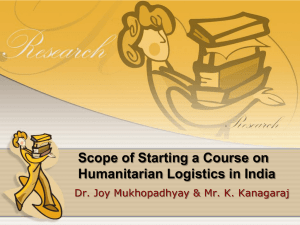A Framework for Emergency Public Procurement During
advertisement
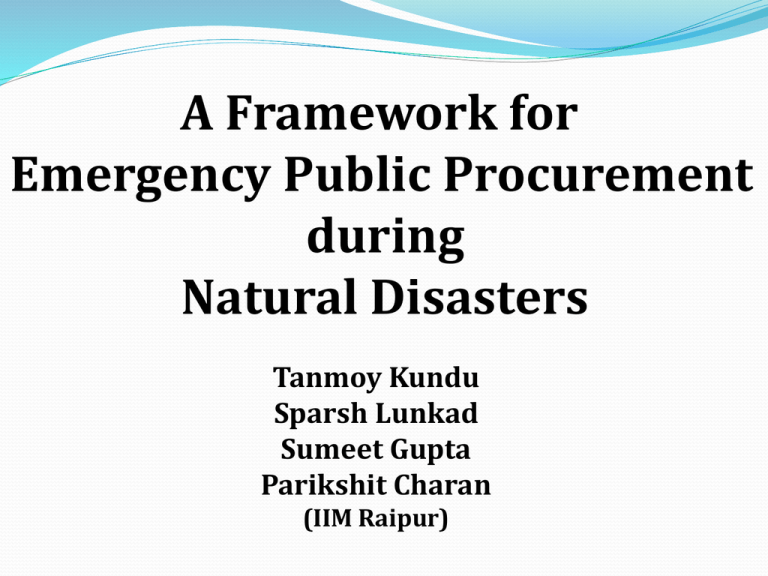
A Framework for Emergency Public Procurement during Natural Disasters Tanmoy Kundu Sparsh Lunkad Sumeet Gupta Parikshit Charan (IIM Raipur) Introduction Responses to disasters are usually multi-faceted and involves preparedness activity and enormous public procurement of products and services. In this respect the conventional procurement policies by the government may not be applicable as the lead time or the response time is very short, hence direct procurement plays an important role in instantaneous supply of desired product and services. The present work proposes a model of direct procurement and disaster preparedness activity which is transparent and effective and can harbor radical changes in the present emergency procurement process. What is Public Procurement ? Public procurement is the process of purchase of goods, services and technologies by government bodies to render the needs of the public authority. The entire process consist of identifying potential suppliers through open tendering or direct sourcing, purchasing and delivering products and services to users or beneficiaries. It is a tool for promoting and sustaining economic growth and socioeconomic development. But In Emergency situation, Due to shorter lead time, instantaneous supply of products and services are needed. Hence the most time efficient way is direct sourcing of product and services. Humanitarian Logistics and Relief Chain (HLRC) Logistics is the vital element in any disaster relief effort, and it is the one that makes the difference between a successful and a failed relief operation. Humanitarian logistics is defined as “the process of planning, implementing and controlling the efficient, cost-effective flow and storage of goods and materials as well as related information from the point of origin to the point of consumption for the purpose of alleviating the suffering of vulnerable people” (Thomas and Kopczak, 2005) Humanitarian logistics is the bridge that brings transition between disaster and relief work and forms a disaster relief supply chain. The general supply chain architecture is transformed into customized supply chain architecture for the disaster relief and is known as Humanitarian logistics and Relief chain (HLRC). The HLRC consists of following elements1. Suppliers or Donors ( NGOs, International aid, Donation from other States) 2. Emergency Public procurement Unit (P) 3. Strategic Distribution unit (D) 4. Beneficiaries (B) SUPPLIERS P D DONORS PRODUCT FLOW INFORMATION FLOW B The humanitarian efforts during impact of any disasters are organized along following broad lines (Kovacs and Spens, 2007): 1. Disaster relief 2. Continuous aid work. The various steps in the Humanitarian Logistics Relief Chain and Disaster Management Cycle are as follows:- PREPAREDNESS RELIEF TO BENEFICIARIES ASSESSMENT RESOURCE MOBILIZATION PROCUREMENT DISTRIBUTION TRACKING TRANSPORTATION Three C’s of Disaster Relief operation: Communication Collaboration Coordination Proposed model The purchase of goods and services at the time of disasters is necessary for smooth operation of relief activities and also to reduce the effect of contretemps. Emergency Procurement is a part of preparedness activity and is carried out using the allocated budget for any disaster prevention scheme by the government or available financial resources or credit. The goal of procurement in relief operations is to enable orders to be placed and delivered on schedule at a good price with zero lead time. The best possible way preferred is to buy locally to avoid delay times. However, according to Wassenhove et al. (2010) some organizations prefer to use their regular suppliers to guarantee the quality and standardization of their supplies, or to get better prices. The dominating characteristics that bring additional complexity and unique challenges to humanitarian relief chain design and management as identified by Beamon (2004) are: Demand pattern Lead time Distribution network configuration Inventory control Information system Strategic goals Performance measurement system Demand characteristics Preparedness Activity The humanitarian logistics and relief chain structure includes predisaster procurement, stock pre-positioning, post-disaster procurement and transportation. It is necessary to prepare pre-procure plans and identify strategic location near the disaster prone areas for prepositioning of relief supplies. Prepositioning can be one of the important strategic decisions in the humanitarian relief chain as it can increase the budgeted relief fund allocated by the government. Although prepositioning is done by some developed countries and humanitarian organization but it need a lot of effort in mimicking the same in developing nations. In order to cope up with the stated complexities involved in designing humanitarian logistics & relief chain a risk management framework can be developed which involves: Identification of products and services needed at the time of natural disasters, such as: Products- Food, Medicines. Services- Temporary Housing, Reconstructions Mechanism for direct sourcing of products and services Emergency procedures may include purchasing of only that which is necessary to cover the requirements of the emergency. Procurement planning can reduce the need for using emergency procedures. Each government bodies and humanitarian aid agency should prepare and maintain a current list of local sources of goods and services that might be needed in an emergency. Information on rates and charges should be established and agreed upon in advance. In addition, some specialized procurement activity such as “on call,” or “as needed” annual contracts for various services may be competitively bid to expedite action, ensure adequate support, and reduce the cost of meeting emergency requirements (Mustafa and Buyurgan, 2011). For Emergency procurement/Direct sourcing: A supplier database portal can be created with reference to the humanitarian aid relation network and maintained by the state government on a centralized platform and the database can be merged with other states portal on national level for the better utilization of resources. Group of names SUPPLIER DATABASE MEDICINE SUPPLIERS MEDICINES RECONSTRUCTION SERVICES MILLERS / PACKED FOOD SUPPLIERS FOOD TEMPORARY HOUSING PWD SUPPLIERS NGO / DISASTER MANAGEMENT AGENCIES NGO & INTERNATIONAL AID & AID FROM OTHER STATES CLOTHES VICTIM MANAGEMENT The portal containing supplier database envelopes all facets of humanitarian aid, such as: The list of medicine and packed food suppliers and transportation providers at each and every district level and the amount donated goods in stock. List of NGOs and humanitarian aid agencies. Also the portal will be regularly updated with the information flows between the field, headquarters and donors during any disaster. The portal will also maintain records of donations for effective utilization and for public knowhow. CONCLUSION Procurement of necessary product by the government is of utmost importance during the onset of any disasters to provide the victims with the necessary products. Hence emergency public procurement forms an important element of the humanitarian logistics chain. The design and operation of a humanitarian logistics and relief chain play a significant role in gaining an effectual immediate response. In order to achieve better improvement in future for pre-disaster preparation and post-disaster response, the training and education needs of humanitarian logisticians should be a part of academic programs. Hence, need of the hour is in developing better procurement strategies and distribution network in order to meet the needs of the end beneficiaries more effectively and efficiently in that order. Tanmoy Kundu, Sparsh Lunkad, Sumeet Gupta, Parikshit Charan IIM Raipur
